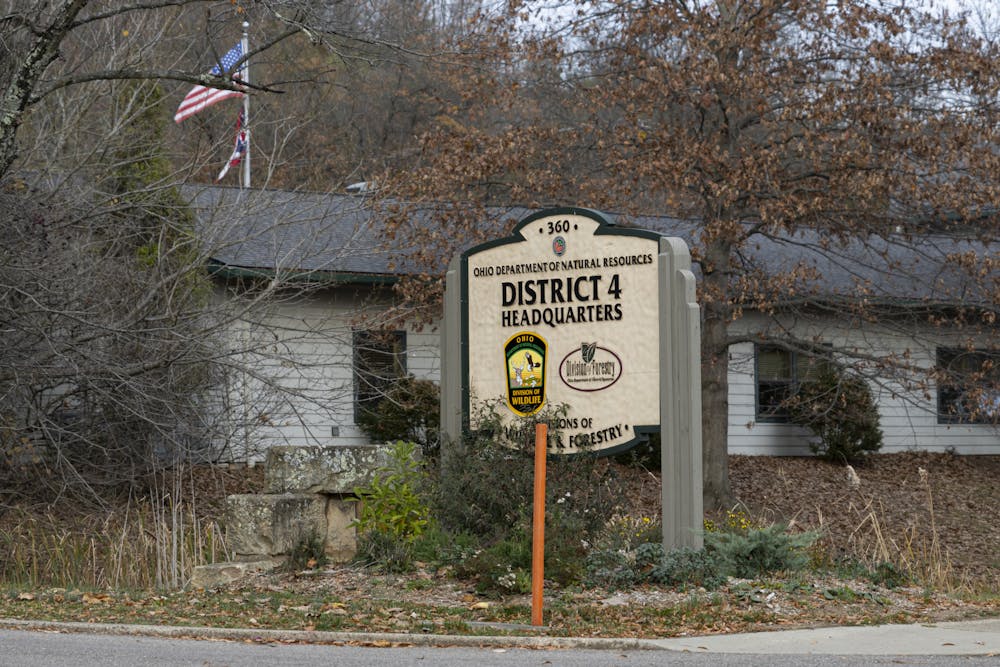Correction Appended: A previous version of this article stated that Save Ohio Parks is attempting to prevent the Muskingum Watershed Conservancy District from accepting bids. The article has been updated to clarify that it is the Oil and Gas Land Management commissioners.
The Oil and Gas Land Management Commission approved the nomination to accept bids from fracking companies, opening up 62 acres of Leesville Wildlife Area to fracking.
The OGLMC said it considered all perspectives before approving the nomination.
“Per Ohio law, the Oil and Gas Land Management Commission is charged with deciding whether or not to lease state mineral rights,” Karina Cheung, spokesperson for the Ohio Department of Natural Resources, wrote in an email. “The OGLMC considers nominations, as well as comments submitted by the public and state agencies, before approving or denying a nomination.”
Randi Pokladnik, a chemist and volunteer at Save Ohio Parks, raised concerns about making the wildlife area available for fracking. Fracking consumes large amounts of water, and adding additional fracking could create issues with the already depleted water supply in Ohio.
Leesville Wildlife Area is part of the Muskingum Watershed Conservancy District which controls the lakes and rivers in 18 counties of Ohio.
Anne Sparks, a steering committee member of Save Ohio Parks, said the MWCD recently decided to stop using water from Atwood Lake for fracking because the water levels were extremely low. It decided instead to get the necessary water from other local sources, including Leesville Lake.
Sparks said Leesville Lake already has low water levels due to the recent drought affecting parts of Ohio, including Carroll County. Sparks said she is worried Leesville Lake will not have enough supply to handle additional fracking.
“Leesville is the backup water supply for the county,” Sparks said. “It’s not good for that water supply to be affected. It’s not good for any of our water supplies to be affected at the amount that’s being taken.”
Sparks said the Leesville area and other parts of Eastern Ohio are home to shale rocks extremely rich in natural gas and are lucrative for the fracking business.
Pokladnik lives on a lake near Leesville and said fracking has been in the area since 2012. She said she is worried fracking companies will continue to move into the area, negatively affecting the local environment.
Pokladnik said most people in the area rely on well water and the drilling could potentially contaminate the water supply, leaving communities with no options for clean water.
“There are countless spills on these well pads, and if the containment devices do not hold that solution, then it runs off,” Pokladnik said. “It runs down and gets into the local landscape or into our streams.”
The OGLMC maintained fracking does not affect communities in the area because it occurs below the surface and the Leesville Wildlife Area will remain unharmed throughout the process.
“The winning bidder is only awarded subsurface rights, and there will be no impact to the surface of the Wildlife Area,” Cheung wrote in an email.
In addition to water pollution, Pokladnik said she is concerned about light pollution and how that could affect the ecosystem. She said the drilling occurs at night and requires bright lights which can confuse animals in the area.
“My husband and I went past one at night, and you can just see the fumes pouring off those diesel generators, and they have them lit up like a Christmas tree,” Pokladnik said. “That does affect migration patterns, mating habits of organisms and animals that live in the area, and so many effects on a forested ecosystem.”
Pokladnik also said the effect on the local economy has been practically nonexistent and most citizens in the area have not received any money from fracking endeavors.
“If they have property, a lot of property, and they sign leases, they may have become rich, but most people around here have not become rich,” Pokladnik said.
Sparks explained that the effects on the economy are due to fracking rights being bought by companies outside of Ohio. The companies will often bring in their own crews and employees, resulting in a minimal number of jobs being added.
Sparks also said the Leesville Lake area has campgrounds, specifically children’s camps, and she cautioned about the health risks to children near fracking zones.
“My main concern about Leesville is the children there, in addition to all the other concerns that we have any time an area is being fracked,” Sparks said. “Especially, like Leesville, when the area is actually being used for recreation and children’s recreation.”
Sparks mentioned a collection made by the Physicians for Social Responsibility, which cited a greater risk of cancer, asthma and skin disease for children living within a mile of oil and gas operations.
The Physicians for Social Responsibility noted data gathered from more than 15 million Medicare recipients and records from more than 2.5 million gas and oil wells. Harvard University found citizens 65 years old and up living near wells were at higher risk of dying earlier than those who lived in areas without fracking.
Sparks said now that the proposal has been approved, her goal is to try to inform the public of the repercussions of fracking in the area.
Sparks said Save Ohio Parks is still trying to prevent the Oil and Gas Land Management commissioners from accepting any of the bids from fracking companies for the Leesville Wildlife Area.






